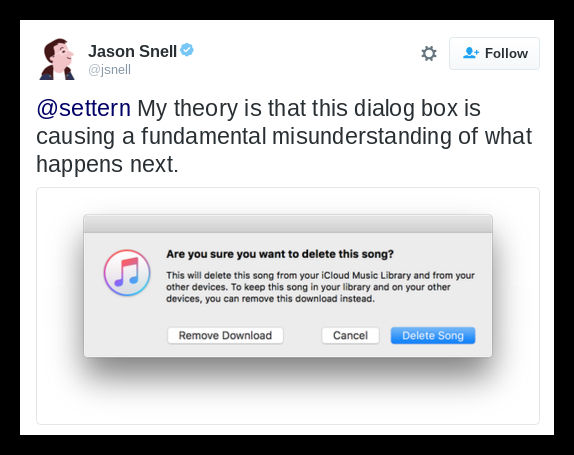Some users have had music files deleted after signing up for Apple Music.
Apple is not "stealing" music from people's personal computers; the deletion of files was likely the result of user error or a problem with software.
On 4 May 2016, an article published on the Vellum Atlanta blog reported that Apple was "stealing" music from people's personal hard drives:
“The software is functioning as intended,” said Amber.
“Wait,” I asked, “so it’s supposed to delete my personal files from my internal hard drive without asking my permission?”
“Yes,” she replied.
I had just explained to Amber that 122 GB of music files were missing from my laptop. I’d already visited the online forum, I said, and they were no help. Although several people had described problems similar to mine, they were all dismissed by condescending “gurus” who simply said that we had mislocated our files (I had the free drive space to prove that wasn’t the case) or that we must have accidentally deleted the files ourselves (we hadn’t). Amber explained that I should blow off these dismissive “solutions” offered online because Apple employees don’t officially use the forums—evidently, that honor is reserved for lost, frustrated people like me, and (at least in this case) know-it-alls who would rather believe we were incompetent, or lying, than face the ugly truth that Apple has vastly overstepped its boundaries.
While we can't confirm if this conversation truly occurred between blogger James Pinkstone and an Apple customer service agent, we can say that Apple is not "stealing" music, nor is it purposefully deleting music files without permission.
However, many users have pointed out flaws in the Apple Music service that could result in music collections being accidentally deleted. In July 2015, Jim Dalrymple detailed his experience with Apple which also resulted in his files being deleted. Dalrymple eventually had his music restored, and concluded that the issue arose from a mixture of user error, a confusing software ecosystem, and a poor matching service:
I’ll admit, I’m still trying to get my head around how this works.
Some of the songs I own were incorrectly tagged as Apple Music, but that’s been fixed too, which means they show up correctly in iTunes. That is great news.
However, I’m still missing a couple of hundred songs. Apple’s theory is that I deleted them—that when I was trying to fix Apple Music, I mistakenly deleted my own files. While I concede that it is within the realm of possibility that I deleted my own files, it doesn’t make sense to me.
Here’s where my confusion comes from. I own all of Ozzy’s albums and quite a few compilations. I can’t think of a single reason why I would download an album I already own, and album that is in my iTunes Library, only to delete it. I can’t think of a good reason for that.
Here’s one possibility. Perhaps I deleted an Ozzy compilation album (I believe I did do that) that contained tracks that were also on some of his studio albums. I’m wondering if iTunes Match deleted my version of those same songs—songs that I own from my own CDs, purely because the titles were the same as those on the compilation album.
A support page for Apple Music clearly states that files residing in iTunes on your Mac or PC are never altered or deleted:
When Apple Music adds these matched songs to your iCloud Music Library, Apple Music doesn’t change or alter your original music files that reside in iTunes for Mac or PC or on your iOS devices from which they were added. We make these matched songs available to your other computers or devices in high quality 256 Kbps AAC, and they can be played on them only while your Apple Music membership is active.
While this description seems straightforward, the Apple blog iMore pointed out on 5 May 2016 that this policy only applied to primary devices. Files downloaded to mobile devices or secondary computers can still be deleted. Also, Jason Snell, the editor-in-chief of Six Colors, a web site dedicated to Apple news, reported that while Apple won't completely delete a file from a main hard drive, it will send a file to the trash bin:
When you press delete on a song in your iTunes Library with Apple Music or iTunes Match enabled, you'll see the following dialog:
If you choose "Remove Download," it will send the local file from your hard drive to your Trash, but leave the reference in your library — so that you can stream that track directly from iCloud Music Library. It won't delete the file until you empty your Trash.
This is great if you're on a laptop and want streaming access to your music library, but you don't want the hassle of having 40GB of music on your hard drive. But it should only ever be done on a secondary computer or secondary iTunes Library— never for your master library.
While it is true that some users have had files deleted when using Apple Music's match service, this was not deliberately done in order to "steal" your music. These file deletions likely occurred due to a mixture of user error, poor matching algorithms, and confusion over how Apple syncs and manages files.


